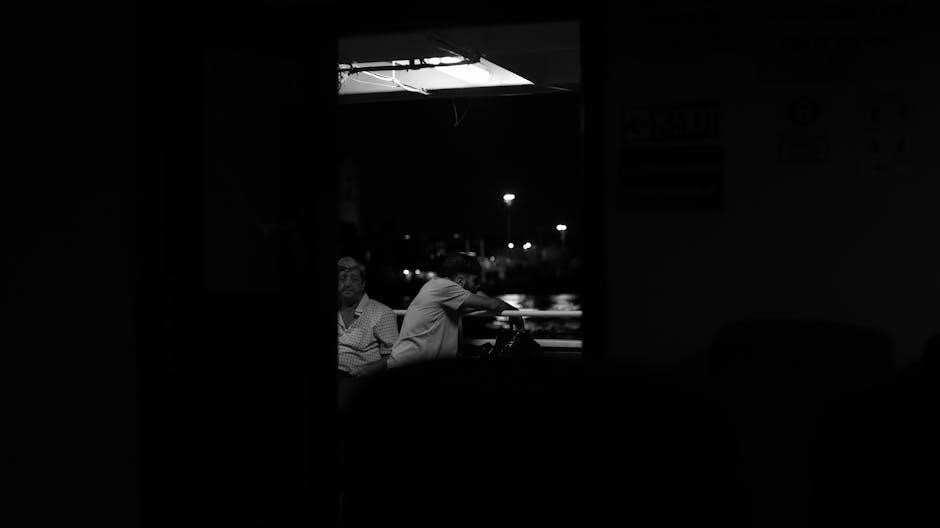
Henry David Thoreau’s night in jail for refusing to pay taxes in protest of slavery and the Mexican-American War symbolizes a pivotal moment in his philosophy of civil disobedience.
Overview of Thoreau’s Act of Civil Disobedience
Thoreau’s act of civil disobedience was a deliberate refusal to pay his poll tax, protesting the Mexican-American War and slavery. His arrest and one-night imprisonment in 1846 symbolized his commitment to moral principle over governmental authority. This act, though brief, became a cornerstone of his philosophy, emphasizing individual conscience and the duty to challenge unjust laws. Thoreau’s defiance was not merely a political statement but a deeply personal stance, reflecting his belief in the power of nonviolent resistance. His experience in jail inspired his seminal essay Civil Disobedience, which argued that individuals should prioritize ethical convictions over institutional demands. This act of protest, though isolated, resonated widely, shaping future movements for justice and freedom. Thoreau’s courage in confronting authority remains a testament to the enduring impact of principled dissent.

Historical Context of the Mexican-American War and Slavery
The Mexican-American War (1846-1848) and the institution of slavery were central issues in Thoreau’s time. The war was driven by U.S. expansionism, particularly the concept of Manifest Destiny, which sought to extend American territory. Thoreau vehemently opposed the war, viewing it as a means to expand slavery into new territories. Slavery was deeply entrenched in the U.S., with the South relying on it for its economy. Thoreau’s refusal to pay his poll tax was a direct protest against these injustices, as he believed that funding the government through taxes condoned its support for slavery and imperialist wars. His actions were part of a broader abolitionist movement, which sought to end slavery and challenge the moral and legal frameworks that upheld it. This historical context underscores Thoreau’s belief in the moral imperative to resist unjust systems, even at personal cost. His stance reflected the growing tensions leading up to the Civil War and highlighted the ethical dilemmas of complicity in state-sponsored injustice.
Background of Henry David Thoreau
Henry David Thoreau was born in 1817, educated in Greek, Latin, and English classics, and deeply influenced by Ralph Waldo Emerson and Transcendentalism. He championed individuality and self-reliance.

Thoreau’s Early Life and Education
Henry David Thoreau was born on July 12, 1817, in Concord, Massachusetts, to a family of modest means. His father, John Thoreau, was a merchant and pencil maker, while his mother, Cynthia Dunbar Thoreau, managed the household. Thoreau’s early life was marked by a deep connection to nature and a strong emphasis on education. He attended Concord Academy, where he excelled academically, and later enrolled at Harvard University in 1833. During his time at Harvard, he studied classical literature, philosophy, and science, graduating in 1837. After college, he returned to Concord and briefly worked as a teacher before opening his own school with his brother, John. This experience shaped his views on education and individual growth, laying the foundation for his future philosophical ideas. Thoreau’s early years also introduced him to prominent thinkers like Ralph Waldo Emerson, who would greatly influence his intellectual journey.

Influence of Ralph Waldo Emerson and Transcendentalism
Ralph Waldo Emerson played a pivotal role in shaping Henry David Thoreau’s intellectual and philosophical trajectory. As a mentor and friend, Emerson introduced Thoreau to the principles of Transcendentalism, which emphasized individualism, spirituality, and the inherent goodness of nature. Emerson’s essay Nature deeply influenced Thoreau, inspiring him to explore the idea that individuals should trust their intuition and live authentically. Transcendentalist ideas encouraged Thoreau to question societal norms and embrace self-reliance, themes that would later define his philosophy. Emerson also provided practical support, allowing Thoreau to live on his property and experiment with simple living, which laid the groundwork for Thoreau’s time at Walden Pond. This intellectual and personal connection between Emerson and Thoreau fostered a shared commitment to challenging unjust systems, ultimately inspiring Thoreau’s act of civil disobedience and his famous night in jail.
Thoreau’s Philosophy of Individuality and Self-Reliance
Henry David Thoreau’s philosophy of individuality and self-reliance was central to his worldview, advocating for people to trust their consciences and resist societal pressures. He believed individuals should prioritize moral principles over unjust laws, as seen in his refusal to pay taxes supporting slavery and the Mexican-American War. This philosophy, deeply rooted in Transcendentalist ideas, emphasized personal autonomy and the importance of living authentically. Thoreau’s belief in self-reliance encouraged people to question authority and take a stand against oppression, even if it meant facing consequences like his night in jail. His ideas challenged the notion of blind obedience to government, promoting instead a life of simplicity, integrity, and alignment with one’s values. Thoreau’s philosophy remains a powerful call to resist oppressive systems and embrace individual freedom, inspiring future movements for justice and equality.
The Night in Jail
Thoreau’s arrest and brief incarceration for refusing to pay taxes became a defining moment, reflecting his commitment to civil disobedience and moral protest against unjust government actions.

Reasons for Thoreau’s Refusal to Pay Poll Tax
Thoreau refused to pay his poll tax as a protest against the Mexican-American War and the institution of slavery, which he deeply opposed. He believed that by paying the tax, he would be indirectly supporting these unjust practices. Thoreau’s decision was rooted in his moral conviction that individuals should not comply with laws that contradict their conscience. He argued that such compliance would make them complicit in the government’s unethical actions. This refusal was a direct expression of his philosophy of civil disobedience, emphasizing the importance of standing against injustice, even if it meant facing personal consequences like imprisonment. Thoreau’s stance was a powerful statement of individual responsibility and the need to challenge authority when it perpetuates harm.
Arrest and Experience in Jail
Thoreau was arrested and spent a night in jail for refusing to pay his poll tax, an act of defiance against the Mexican-American War and slavery. The arrest occurred in Concord, Massachusetts, after he declined to comply with the tax collector’s demands. Thoreau’s refusal was a deliberate expression of his moral opposition to the government’s policies, which he viewed as unjust. During his brief incarceration, he reflected on the ethical implications of his actions and the role of individual conscience in challenging authority. Thoreau’s experience in jail, though short-lived, deeply influenced his philosophy of civil disobedience, as he later documented in his essay. His calm demeanor and resolve during the arrest and imprisonment underscored his commitment to standing by his principles, even in the face of legal consequences.
Immediate Aftermath of His Release
Following his release from jail, Thoreau’s act of civil disobedience gained attention, though it was not widely known at the time. His refusal to pay the poll tax and subsequent arrest highlighted his commitment to moral principles over governmental authority. After being released, Thoreau resumed his life in Concord, continuing to advocate for his beliefs. The experience reinforced his philosophy of individual resistance to unjust laws, which he later articulated in his essay Civil Disobedience. Thoreau’s brief imprisonment became a symbol of moral courage, inspiring others to question authority and stand up for their convictions. Despite the brevity of his jail time, the aftermath underscored the power of peaceful protest and the importance of personal integrity in challenging societal norms. His actions left a lasting legacy, influencing movements for justice and equality in the years to come.

Thoreau’s Essay “Civil Disobedience”
Thoreau’s essay, first published in 1849, critiques unjust governance and advocates for moral resistance. It reflects his refusal to pay taxes supporting slavery and war, influenced by Emerson’s transcendentalism.
Key Arguments in “Civil Disobedience”

Thoreau’s essay “Civil Disobedience” presents compelling arguments against unjust laws and oppressive governance. He asserts that individuals should prioritize their conscience over governmental authority, especially when laws contradict moral principles. Thoreau critiques the Mexican-American War and slavery, viewing them as immoral institutions supported by the state. He argues that citizens have a moral duty to resist such injustices, even if it means accepting penalties like imprisonment. Thoreau emphasizes the power of non-violent resistance, advocating for individuals to refuse complicity in unjust systems. He also challenges the notion of blind patriotism, urging people to question and act against governmental actions that violate ethical standards. Thoreau’s central idea is that true progress comes from individuals standing up for what is right, rather than passively following authority. His arguments remain influential, inspiring movements for justice and equality worldwide.
Structure and Style of the Essay
Thoreau’s “Civil Disobedience” is structured as a concise, direct critique of government and morality. It begins with his personal experience of spending a night in jail for refusing to pay taxes, setting the tone for his argument. The essay then expands to explore the broader principles of individual conscience and the role of citizens in challenging unjust laws. Thoreau’s style is characterized by simplicity, clarity, and moral urgency, making his ideas accessible to a wide audience. He employs rhetorical questions and vivid imagery, such as the “walls of solid stone” in jail, to emphasize his points. The essay blends personal narrative with philosophical reflection, creating a powerful call to action. Thoreau’s direct and forceful language underscores his belief in the necessity of moral action over passive obedience to authority.
Reception and Impact of the Essay
Thoreau’s essay “Civil Disobedience” had a profound and lasting impact, shaping political and social movements worldwide. Initially, the essay gained limited attention, but its influence grew over time, particularly during the Civil Rights Movement. Leaders like Martin Luther King Jr. drew inspiration from Thoreau’s arguments, adopting nonviolent resistance as a core strategy. The essay’s emphasis on moral conscience and the duty to challenge unjust laws resonated globally, influencing figures such as Mahatma Gandhi, who applied its principles to India’s struggle for independence. Today, “Civil Disobedience” remains a cornerstone of political philosophy, inspiring activists and thinkers to confront inequality and injustice. Its timeless message underscores the power of individual action and the importance of standing against oppressive systems, ensuring its relevance in modern debates about freedom and morality.

Legacy of Thoreau’s Act

Thoreau’s act of civil disobedience and his night in jail inspired movements for justice globally, influencing leaders like Gandhi and Martin Luther King Jr., leaving a lasting impact on nonviolent resistance and moral courage.
Influence on the Civil Rights Movement
Thoreau’s night in jail and his essay “Civil Disobedience” deeply influenced the Civil Rights Movement. Leaders like Martin Luther King Jr. drew inspiration from Thoreau’s stance against unjust laws, applying nonviolent resistance to challenge segregation and racial inequality. King often referenced Thoreau’s ideas in his writings and speeches, emphasizing the moral duty to defy oppressive systems. The sit-ins, marches, and other forms of peaceful protest during the 1950s and 1960s mirrored Thoreau’s philosophy of refusing to comply with laws that violated human dignity. His act of refusing to pay taxes to support slavery and war became a powerful symbol of moral courage, encouraging Civil Rights activists to stand firm in their convictions, even in the face of imprisonment. Thoreau’s legacy thus became a cornerstone of the movement’s strategy, proving that individual actions could spark broader societal change and inspire collective resistance against injustice. His ideas continue to resonate in the fight for equality and human rights today.
Impact on Global Movements for Justice
Thoreau’s act of civil disobedience and his essay have inspired global movements for justice. His ideas influenced leaders like Mahatma Gandhi, who adopted nonviolent resistance in India’s struggle for independence. Similarly, Nelson Mandela and the anti-apartheid movement in South Africa drew strength from Thoreau’s philosophy. The essay’s emphasis on moral responsibility and the power of individual action has resonated worldwide, shaping protests against injustice in various forms. From environmental activism to labor rights, Thoreau’s principles have motivated people to challenge oppressive systems. His night in jail became a symbol of courage, proving that even small acts of defiance can ignite broader change. Today, his ideas continue to inspire global movements, reminding individuals of their power to stand against inequality and fight for human rights. Thoreau’s legacy extends far beyond America, influencing struggles for justice on every continent. His philosophy remains a timeless blueprint for ethical resistance.
Modern Relevance of Thoreau’s Ideas
Thoreau’s ideas remain highly relevant in modern times, offering guidance on individual responsibility and ethical action. His philosophy of civil disobedience continues to inspire contemporary movements, such as climate protests and racial justice campaigns. The essence of his argument—that individuals should not passively obey unjust laws—resonates deeply in today’s society. Thoreau’s emphasis on self-reliance and moral courage encourages people to question authority and advocate for change. His night in jail serves as a powerful reminder that even small acts of defiance can have profound implications. In an era marked by political polarization and environmental crises, Thoreau’s teachings remind us of the importance of standing up for what is right, even in the face of adversity. His ideas are a timeless call to action, urging individuals to align their actions with their conscience and work toward a more just world. Thoreau’s legacy endures as a vital source of inspiration for modern activism.
Thoreau’s night in jail symbolizes enduring moral courage, inspiring future generations to challenge injustice and uphold conscience over unjust laws, leaving a lasting legacy of ethical resistance.
Thoreau’s Night in Jail as a Symbol of Moral Courage
Thoreau’s night in jail stands as a profound symbol of moral courage, embodying his unwavering commitment to justice and conscience. By refusing to pay taxes that supported slavery and the Mexican-American War, he challenged unjust systems, demonstrating the power of individual action. His brief imprisonment became a catalyst for his essay Civil Disobedience, which advocates for nonviolent resistance against oppressive governance. This act of defiance not only highlighted the importance of standing up for ethical principles but also inspired future movements for civil rights and freedom worldwide. Thoreau’s courage in confronting authority, even at personal cost, remains a timeless example of the transformative potential of moral conviction. His night in jail symbolizes the enduring strength of conscience over conformity, leaving a lasting legacy of ethical resistance.

Enduring Lessons from Thoreau’s Philosophy
Thoreau’s philosophy offers timeless lessons in individuality, moral integrity, and the power of nonviolent resistance. His refusal to comply with unjust laws, exemplified by his night in jail, underscores the importance of standing by one’s conscience, even in the face of societal pressure. Thoreau’s belief in self-reliance and the inherent worth of the individual encourages people to question authority and seek personal freedom. His ideas emphasize the moral responsibility to challenge systems that perpetuate inequality and injustice, inspiring countless movements for civil rights and social change. Today, Thoreau’s teachings remind us that true progress often begins with individual courage and the willingness to act on principle. His philosophy continues to resonate, urging people to live deliberately, think critically, and remain committed to justice and equality in all aspects of life.


